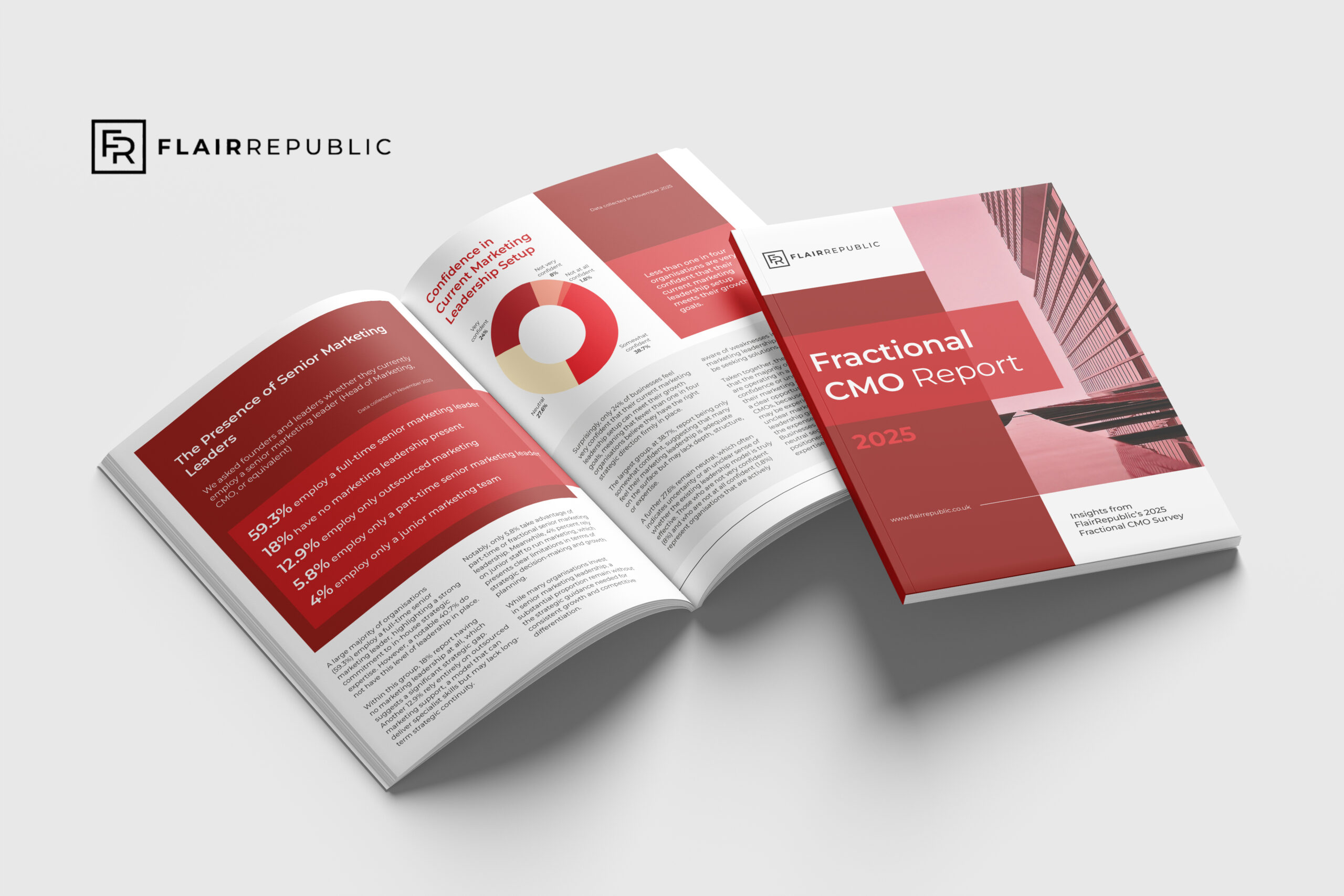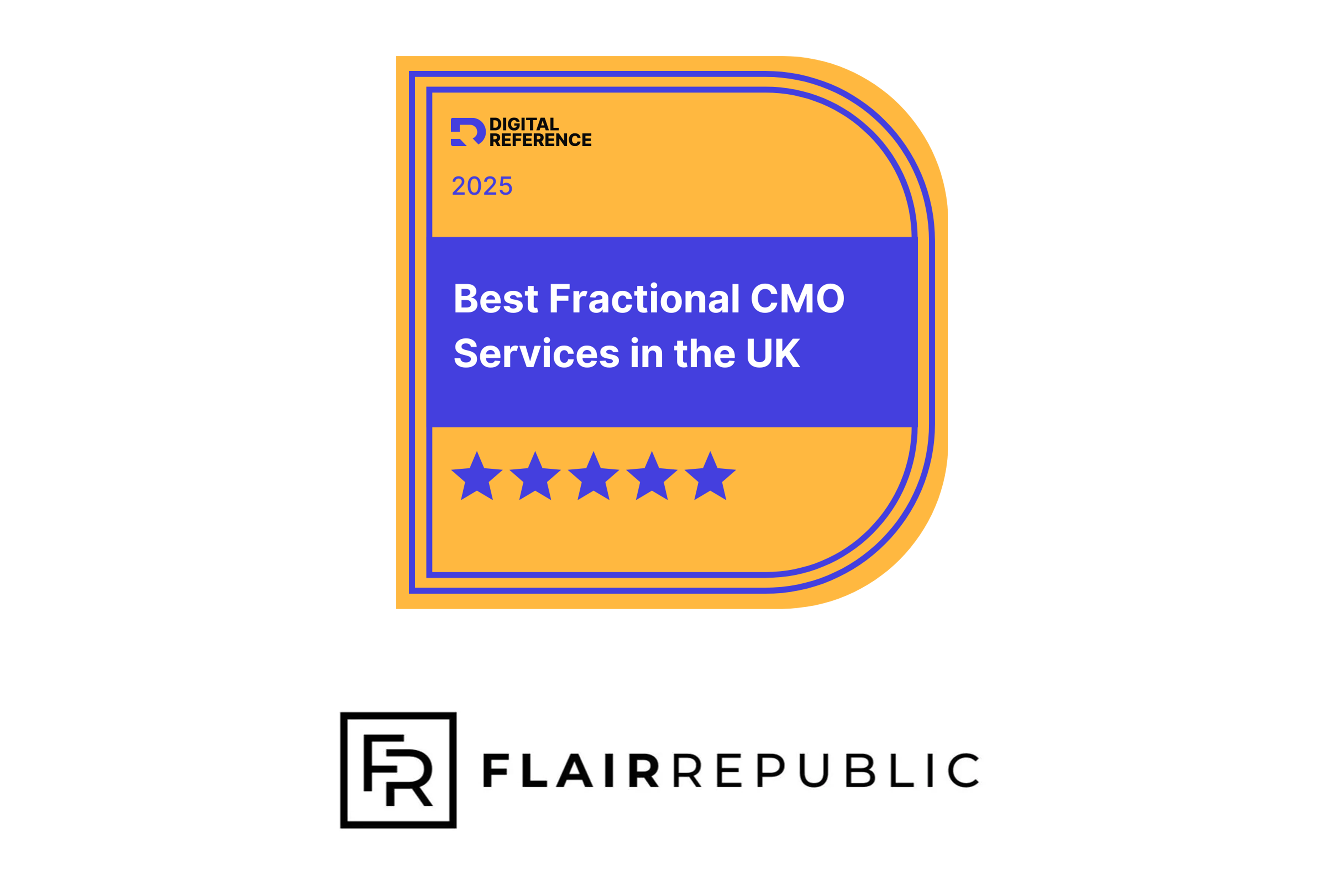
How Fractional CMOs Align Local Insight with Growth
Contents
From the boardroom of a Surrey-based manufacturer to the executive suite of a tech scale-up in Yorkshire, the question keeps emerging. Does one size of marketing leadership really fit all? For many regional businesses across the UK, the traditional approach of hiring a full-time Chief Marketing Officer (CMO) is showing its cracks. High cost. Heavy overhead. Long onboarding. Slow adaptability.
The fractional CMO model isn’t a whim of gig economy marketing, but a considered strategic shift. One that brings senior marketing leadership on demand, for the period you need it, guided by regional context and able to plug into your business quickly. It’s not about cutting corners, but about redirecting purpose and relevance.
The shifting landscape of marketing leadership
Let’s start with the numbers. Research suggests that the salary band for a full-time CMO in the UK ranges broadly, one view sets an average around £187,500, with a starting level circa £125,000 and top-end up towards £250,000, depending on company size and sector, according to Intelligent People’s UK marketing salary guide.
Glassdoor’s UK CMO salary data places many CMOs at around £119,000 per year in typical roles, with high variability.
For a business based in a county like Surrey, Kent, Berkshire or Hampshire, that’s a significant cost burden, especially where marketing leadership must also be hands-on, agile and aligned to regional markets rather than simply replicating a London-centric blueprint.
Meanwhile, marketing budgets and spend in the UK are under pressure and undergoing change. According to the IPA Bellwether Report (Q2 2025), adspend growth has been revised down from 1.3% to just 0.7%.
Reflecting this, Business in the News’ SME marketing survey found that 58% of UK SMEs spend less than £250 per month on marketing (just £3,000 per year) and 65% admit time is their biggest obstacle.
In short, the overhead of a senior marketing leader is rising, while the strategic environment demands more agility, local insight, measurable outcomes and less fixed cost.
Why the full-time CMO model often misfits regional companies
The logic of hiring a full-time CMO still holds in certain contexts – large corporates, multi-national brands, complex global markets. But for many regional UK businesses, especially in counties outside the primary London bubble, the full-time model presents three recurring misalignments: cost, relevance and agility.
Cost: As noted, the pay scale for senior marketing leadership is steep. Beyond salary there are bonuses, pensions, benefits, and often significant living-cost expectations (especially if commuting to or residing near London).
Relevance: A CMO drawn from a large metropolitan brand may bring an excellent national-or-global mindset — but less local nuance. Consider a business in Surrey servicing regional professional services, or a manufacturer in Yorkshire targeting the Midlands and North. The audience, the channels, the regional ecosystem differ. Local insight matters.
Agility: Full-time roles bring inertia. Strategic shifts take longer. Hiring, cultural embedding, budget approvals, reporting lines — the mechanism carves time. Meanwhile, marketing environments shift fast: digital tools, algorithm changes, new regulatory pressures, local competitive shifts. The model demands speed and nimbleness.
Hence the rise of the fractional CMO model.
What a fractional CMO brings: local insight with strategic muscle
The term fractional CMO describes an experienced senior marketing leader who works part-time, on a contract or retainer basis, bringing strategic oversight but without the usual full-time costs of a CMO.
That describes the model. Now let’s unpack what that means for regional companies across counties.
Strategic leadership without full-time cost
You gain a seasoned marketing leader. Someone who has been in the seat before, who understands brand, growth, KPIs, channels, but you engage them for 20 %, 40 %, or whatever suits your scale. Your fixed salary cost drops significantly as you only pay for the time and output needed.
Deep local and county-level insight
Because you’re not replicating a London-only marketing leadership model, you engage someone attuned to your county-specific ecology – Surrey’s service-oriented clusters, Kent’s proximity to London and ports, West Yorkshire’s manufacturing heritage, the Midlands’ SME-driven ecosystem. They know the networks, the local value chains, the local marketplaces.
Alignment of tactics with business goals
A good fractional CMO doesn’t parachute in and run “marketing as usual.” They anchor on business growth objectives – market expansion, diversification, digital transformation, building marketing-ops infrastructure and align marketing strategy accordingly.
Agile scaling and flexibility
When marketing priorities shift, you scale up or down the engagement. This flexible model supports businesses that are growing, pivoting or seasonal – common across UK counties.
Data snapshot: UK marketing spend, SME realities and county business context
Understanding the local strategy requires context. Here are some key data points reflecting the current UK environment.
- The SME Marketing Report 2025 advises small businesses to allocate 5–10% of annual revenue to marketing.
- According to SoPro’s State of Marketing Spend 2025, only a net balance of 1.9% of companies increased marketing budgets in late 2024.
- Vistage’s UK Marketing Strategy Outlook 2025 predicts digital marketing budgets will grow by 7.3%, while total budgets rise just 3.3%.
- Startups.co.uk’s small business statistics show SMEs contribute around £2.8 trillion in turnover — nearly half of UK employment.
- Constant Contact’s UK SMB Now Report 2025 finds 72% of SMEs plan to use AI for marketing, but only a third currently have advanced marketing tech or data skills.
The inference: regional businesses face tighter budgets, faster shifts in digital and local consumer behaviour, and often fewer in-house senior marketing skills. The fractional CMO model presents one strategic answer.
UK Counties and Their Industry Strengths
One of the key advantages of fractional CMOs is their ability to adapt strategies to the dominant industries and economic strengths of each region. Understanding these sectors allows for campaigns that resonate with customers, optimise spend, and drive growth. Here’s a breakdown of some UK counties and their business characteristics:
Surrey and Hampshire
Known for: Professional services, tech scale-ups, aerospace, and defence
Businesses here often cater to high-value clients and operate in competitive B2B markets. A fractional CMO can design strategic campaigns targeting enterprise clients, optimise lead generation, and ensure marketing spend is aligned with revenue goals.
Buckinghamshire, Kent and Sussex
Known for: Logistics, ports, creative industries, horticulture
These counties benefit from proximity to London and access to major transport hubs. Marketing strategies may emphasise supply chain capabilities, creative branding, and sustainability messaging, tailored to both regional and national audiences.
West Yorkshire and Lancashire
Known for: Manufacturing, advanced engineering, digital media
Businesses often operate in highly technical sectors with complex customer journeys. Fractional CMOs can integrate product-focused campaigns, optimise trade marketing, and streamline B2B communications.
Cambridgeshire and Oxfordshire
Known for: Tech clusters, biotech, research-heavy sectors
With a concentration of innovation hubs, businesses benefit from growth-driven, analytics-focused marketing strategies. Fractional CMOs help translate complex technological offerings into compelling narratives for investors, clients, and partners.
Devon and Cornwall
Known for: Tourism, food & beverage, sustainability-driven businesses
Marketing here focuses on consumer engagement, brand storytelling, and seasonal campaigns. Fractional CMOs can optimise social media, partnerships, and event marketing to capture high-value tourism and local consumer markets.
Glasgow and Edinburgh (Scotland)
Known for: Financial services, tech, energy (oil and renewables)
Companies often operate in highly regulated sectors, where compliance, thought leadership, and brand authority are essential. Fractional CMOs can provide strategic oversight, content strategy, and campaign optimisation to maximise reach and influence.
Belfast and County Down (Northern Ireland)
Known for: Aerospace, agri-food, engineering
Regional businesses benefit from export-oriented marketing strategies. Fractional CMOs can help position companies for international expansion, craft effective trade communications, and integrate digital marketing channels to support growth.
Additional counties of note
- Derbyshire – Manufacturing and logistics
- Somerset – Tourism and food production
- Leicestershire – Advanced engineering and distribution
- Lancashire – Textiles, manufacturing, and digital media
Across all these counties, fractional CMOs provide strategic oversight that aligns marketing initiatives with industry-specific challenges and opportunities, ensuring campaigns deliver measurable ROI.
How to engage a fractional CMO: a framework
If you’re in a county-based business and you’re thinking “this could work for us”, here’s a practical framework.
- Define the scope and outcome – Set growth and transformation goals.
- Set the cadence and contract – Define time, deliverables and leadership structure.
- Embed regional insight – Choose a CMO who understands your county.
- Align the team – Let them lead strategy while guiding your team.
- Monitor and adapt – Track KPIs and take an agile approach when priorities change.
- Plan future scaling – Decide if this is transitional or your ongoing model.
Why the model supports growth beyond your county
When your marketing leadership understands your county’s character — talent availability, cost base, networks, culture — they build foundations that can scale.
You’ll see:
- Consistent brand messaging across regions.
- Better ROI through strategic alignment.
- Agility in new markets.
- Cost-effectiveness without sacrificing experience.
A strong fractional CMO doesn’t compromise on ambition, but instead is amplified.
The future of marketing leadership in UK regional businesses
Marketing is no longer a cost centre. It’s a growth engine. For regional UK businesses, three trends stand out:
- On-demand leadership will become the norm outside London.
- Local insight plus national ambition will define success.
- Data-driven, agile strategies will outperform high-budget campaigns — as supported by Vistage’s 2025 marketing report.
Rethinking leadership, redefining growth
If you’re a county-based business in Surrey, Kent, Merseyside or beyond, and you’re frustrated by the cost of full-time senior marketing hires, it’s time to rethink. Whether you are in manufacturing, professional services, tourism, technology, or financial services, this model allows businesses to thrive, leveraging the unique strengths of each county to achieve measurable results.
The fractional CMO model offers top-tier strategic leadership, local alignment, flexibility and measurable impact without full-time overhead.
Get in touch with us to see how strategic marketing leadership can help you grow your business, wherever your business operates.





